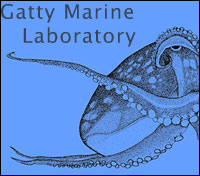Gatty Marine Laboratory

The Gatty Marine Laboratory was opened in 1896 and has been continuously occupied except for the period between 1931 and the end of the Second World War. Research at the Laboratory deals with the behaviour, ecology, physiology, population biology and functional genomics of marine organisms. Strong collaborative links are maintained with leading research groups world-wide.
For more information please visit the Scottish Oceans Institute home page.
This material is presented to ensure timely dissemination of scholarly and technical work. Copyright and all rights therein are retained by authors or by other copyright holders. All persons copying this information are expected to adhere to the terms and constraints invoked by each author's copyright. In most cases, these works may not be reposted without the explicit permission of the copyright holder.
Collections in this community
Recent Submissions
-
Evolution of muscle regulatory genes in chordates
(University of St Andrews, 2016-11-30) - Thesis -
Mechanical properties of fish myotomal muscle
(University of St Andrews, 1995-01) - Thesis -
Neural events underlying escape swimming behaviour in the squat lobster 'Galathea strigosa' (Crustacea, Anomura)
(University of St Andrews, 1984) - Thesis1. The anatomy and physiology of escape swimming behaviour in the squat lobster, Galathea strigosa, have been investigated and the results discussed in the context of comparative mechanisms of escape in rela~ed species. 2. ... -
Physical, biological and cultural factors influencing the formation, stabilisation and protection of archaeological deposits in U.K. coastal waters
(University of St Andrews, 1995) - ThesisA considerable corpus of information regarding the formation of terrestrial archaeological deposits exists which is not matched by studies of deposit formation in coastal waters. Similarly, there is a disjunction between ... -
Aversiveness of sound in marine mammals : psycho-physiological basis, behavioural correlates and potential applications
(University of St Andrews, 2008) - ThesisUnderstanding what psycho-physiological and behavioural factors influence aversiveness of sound in marine mammals is important for conservation and practical applications. The aim of this study was to determine predictors ...
